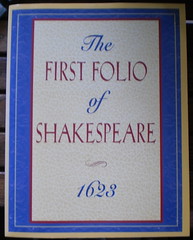Facebook has a lot of junk floating around it. You can take a survey about anything. You can join a fan site. You can play games. I noticed Carole and David had these posts regarding "30 Day [insert noun] Challenge". For 30 days, you have a topic and you post something that, to you, reflects that topic. I've seen music and movies. Carole is working through the "30 Day Book Challenge". This was intriguing so I decided I'd do it too, but post my books here as well as on Facebook.
I started yesterday. I had to be out in the heat yesterday for a good 4 hours and that just roasts your logic and thought processes. So I didn't post anything, obviously. Today there will be 2 book posts. As I don't always post daily and, in some cases, I can't post daily, you'll need to bear with me getting caught up on occasion. I'm going to try to keep on the daily schedule, August 1 to 30.
Day number 1 was easy. "Your Favorite Book". I chose Macbeth by Shakespeare. I used to have Hamlet as my favorite book. One of my life guiding quotes is from Act 1, Scene 3, where Polonius gives advice to his son, Laertes.
"To thine own self be true And it must follow, as night the day, Thou can'st then be false to any man."
Of course we all know the "To be, or not to be, That is the question. Whether 'tis nobler in the mind to suffer the slings and arrows of outrageous fortune Or to take arms against a sea of trouble And by opposing, end them."
Great quotes and scholars have debated "To be, or not to be" for millenia. Just what was Shakespeare saying here?
Macbeth is less quoted and it's usually the witches, "Double, double, toil and trouble. Fire burn and cauldron bubble", or "By the pricking of my thumbs, something wicked this way comes." Lady Macbeth's "Out damned spot! Out, I say!" in reference to her madness at being unable to get her hands clean of Duncan's blood.
It's not the abundance of quotes which can be tossed into a conversation that makes Macbeth my favorite. I've come to appreciate how rooted in Scottish history the play is. Shakespeare probably wrote the play for King James who was a Scot. As he fancied himself descended from Banquo, the commissioned work was intended to show how James was really the heir to the Scottish throne. James' ancestral opponents were shown to be horrible monsters capable of offing a king in an attempt to gain the throne they couldn't get any other way.
What I've been intrigued by is Lady Macbeth. This is one of Shakespeare's most complex plays. The main characters have nuances well beyond the words on the page. What could have driven a woman to force her husband to kill a sitting king? The dim history we have from the time period of the real Macbeth suggests Lady Macbeth's father was the rightful heir to the Scottish throne, but he was killed. The real Macbeth, who came by the throne legally, had a perfectly uneventful reign.The person we think we knew is all a product of a play wright creating something 400 years after the fact and catering strictly to his royal audience.
I think I should reread this.
Beverage: Edinburgh's Finest tea
Deb

No comments:
Post a Comment